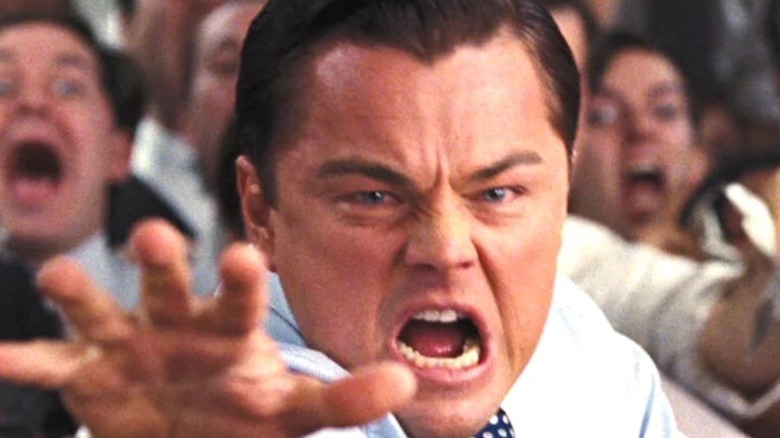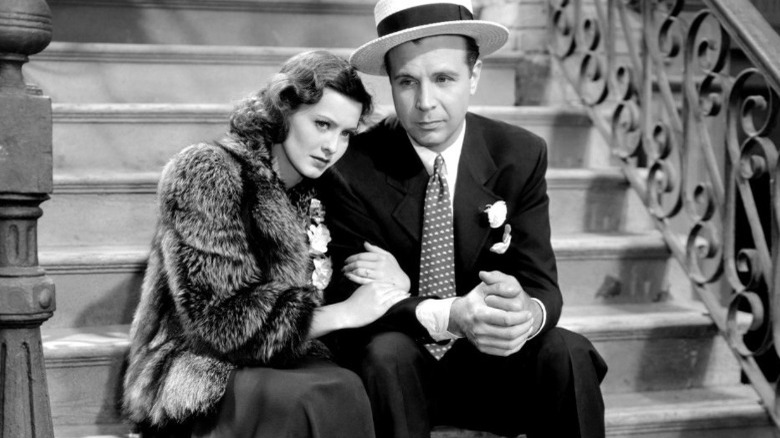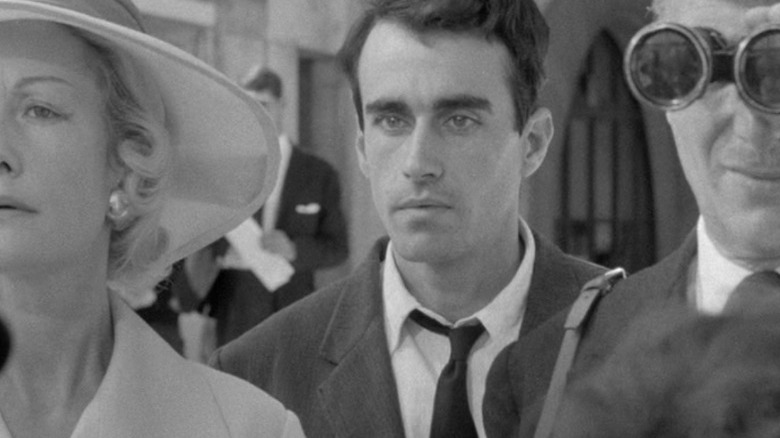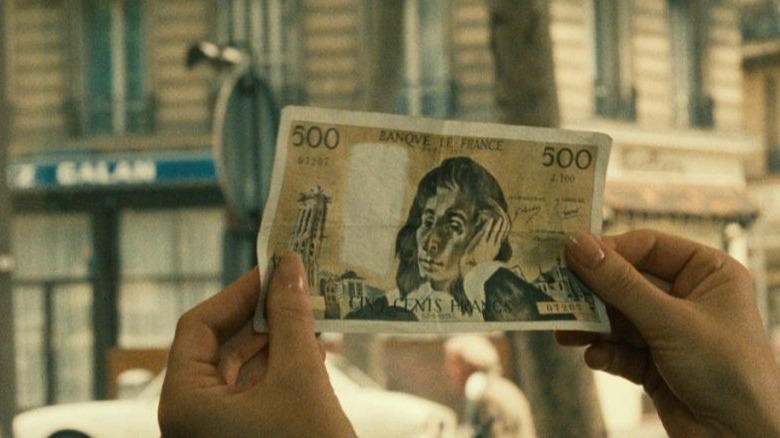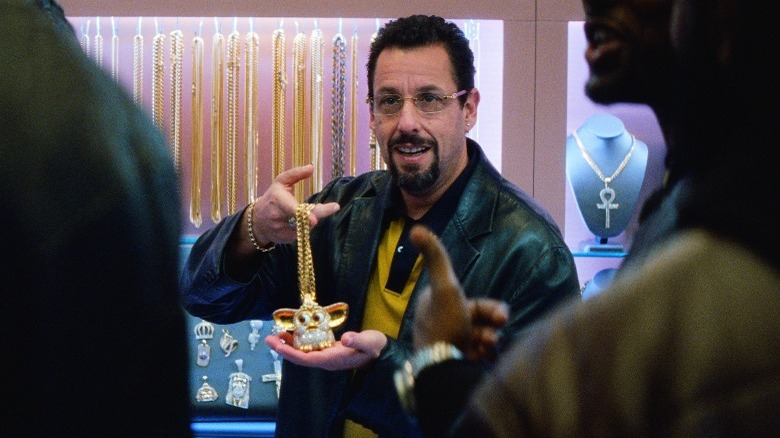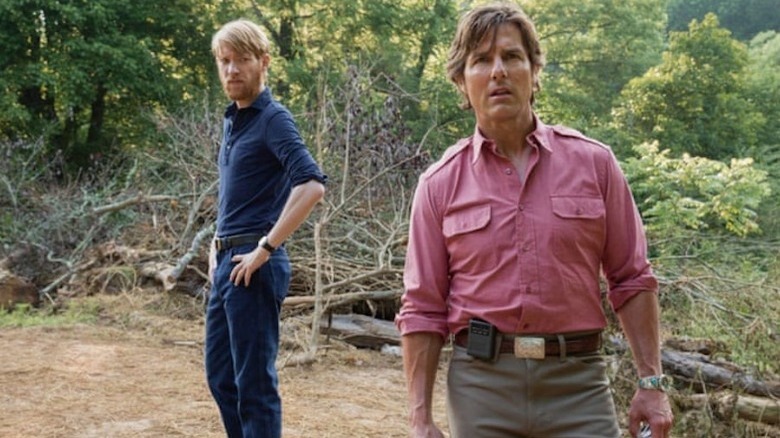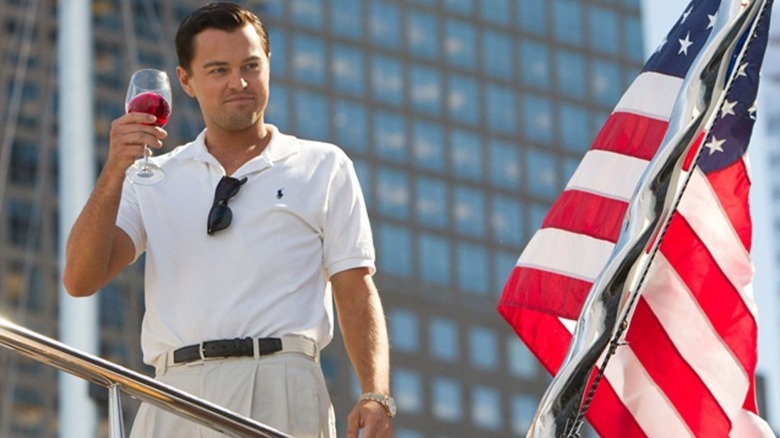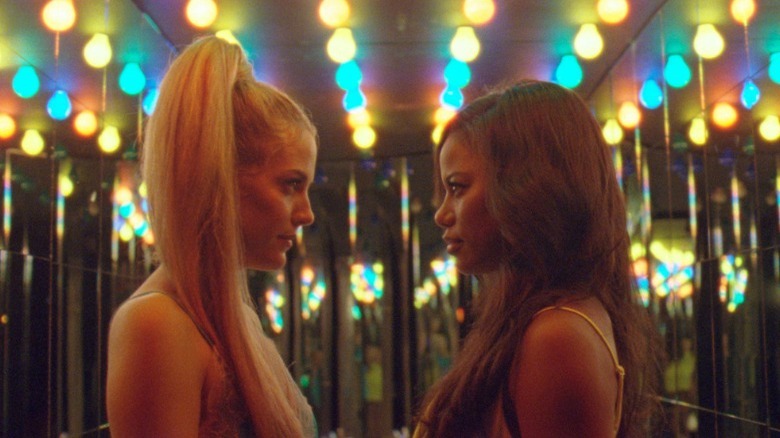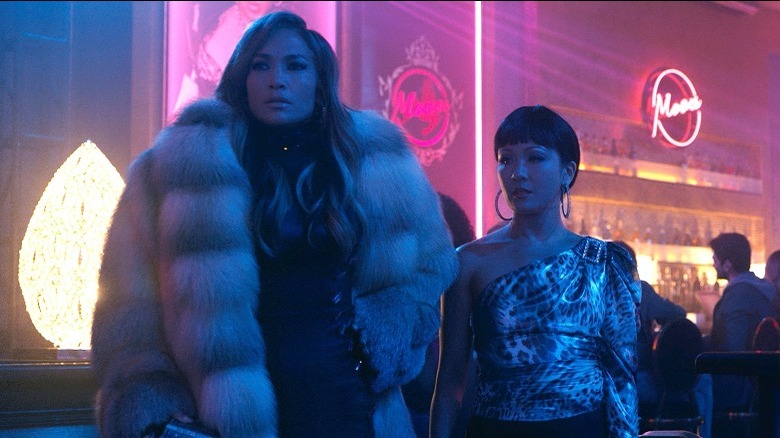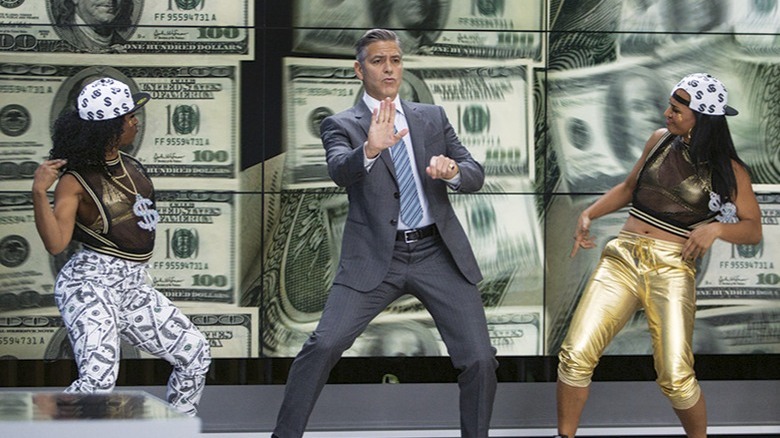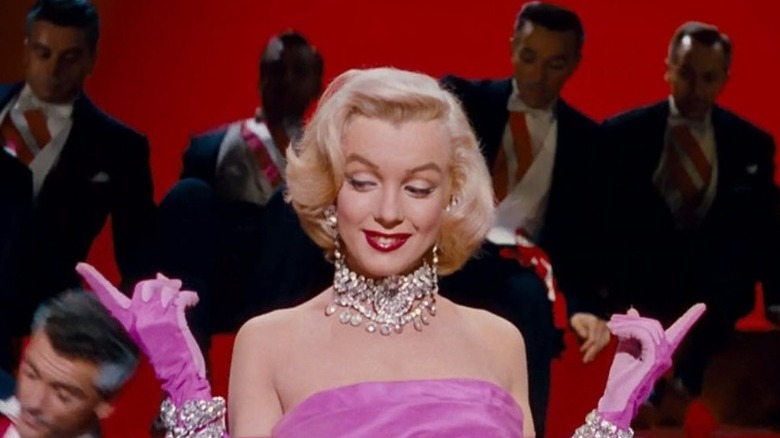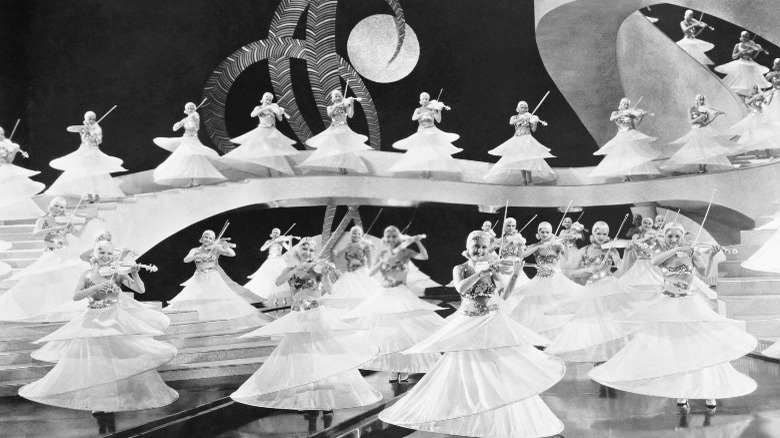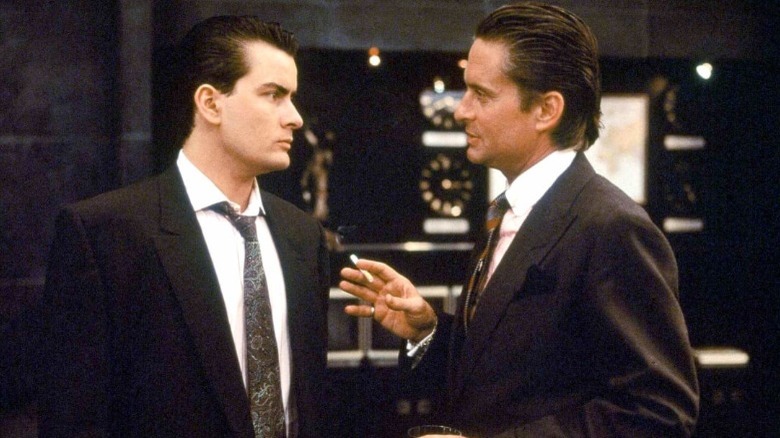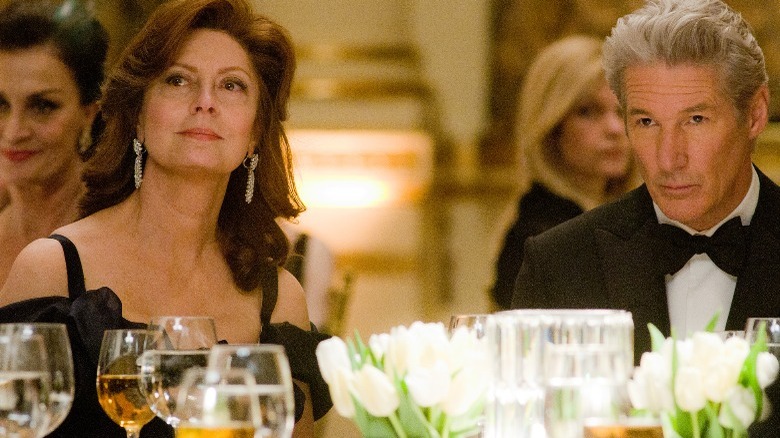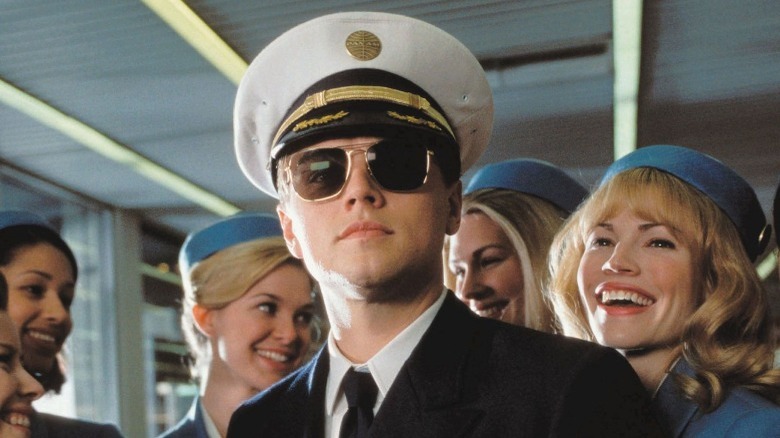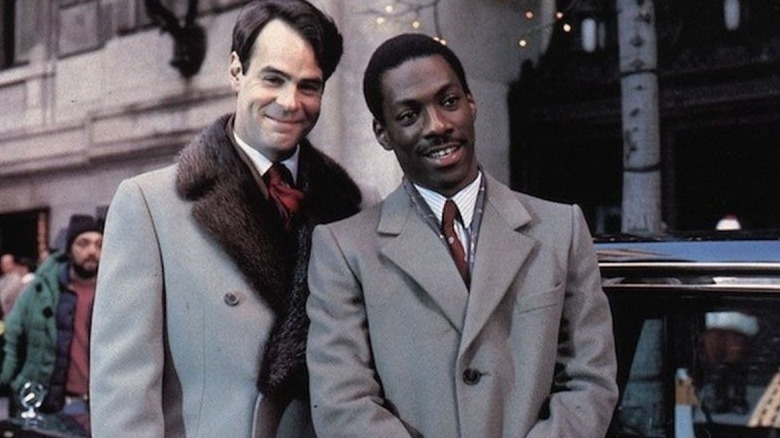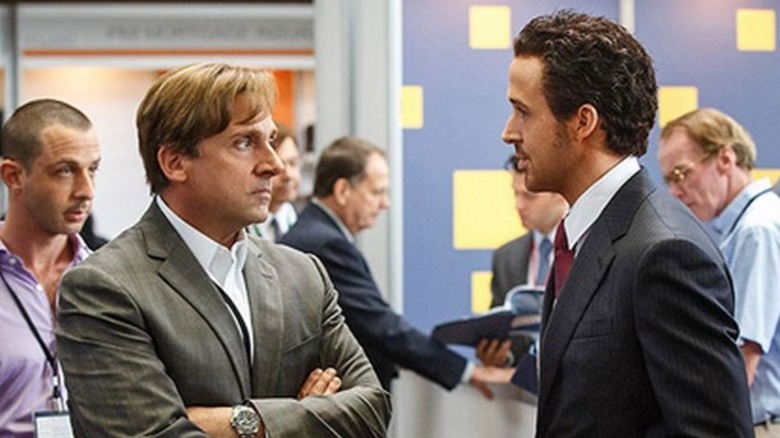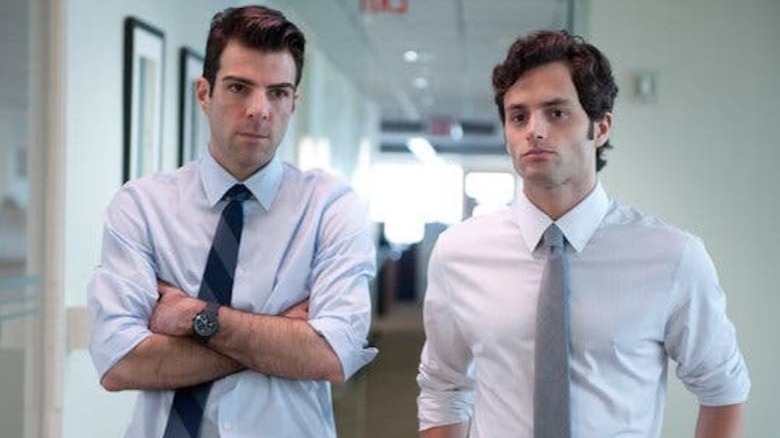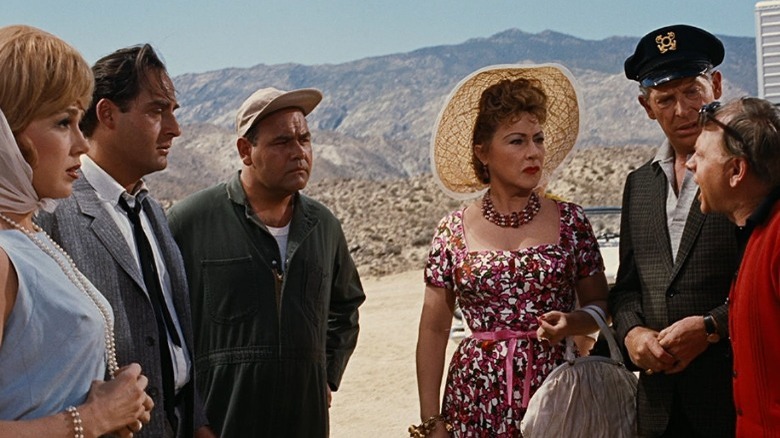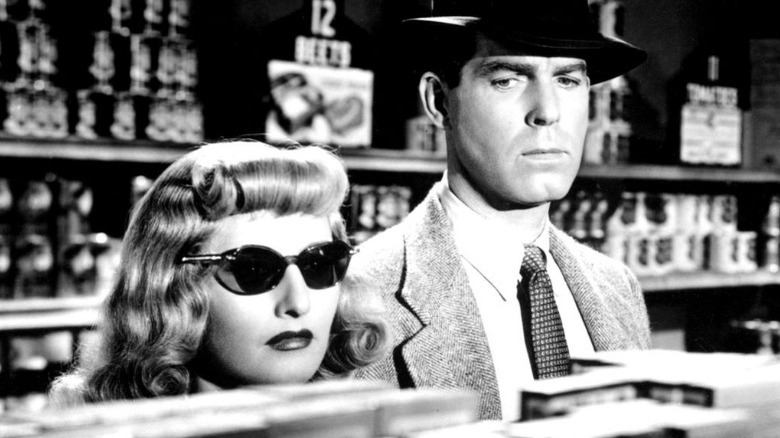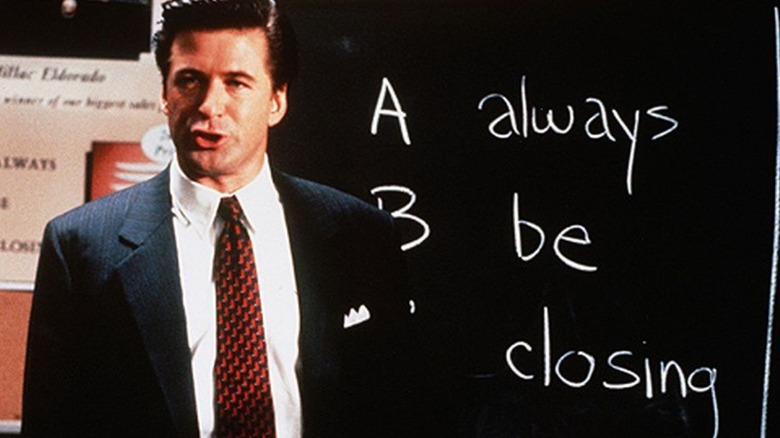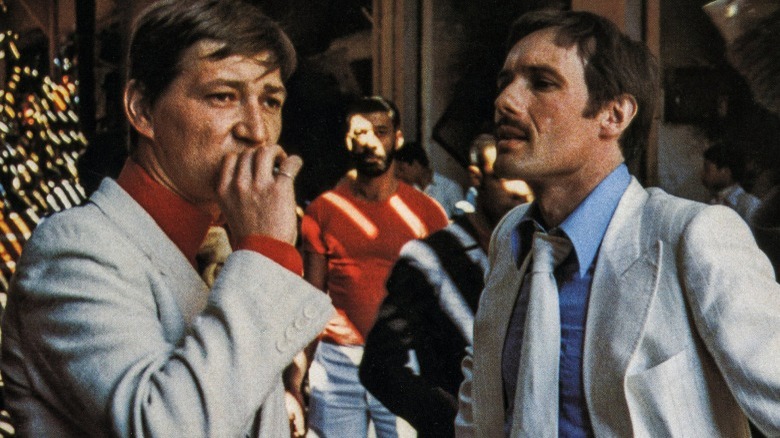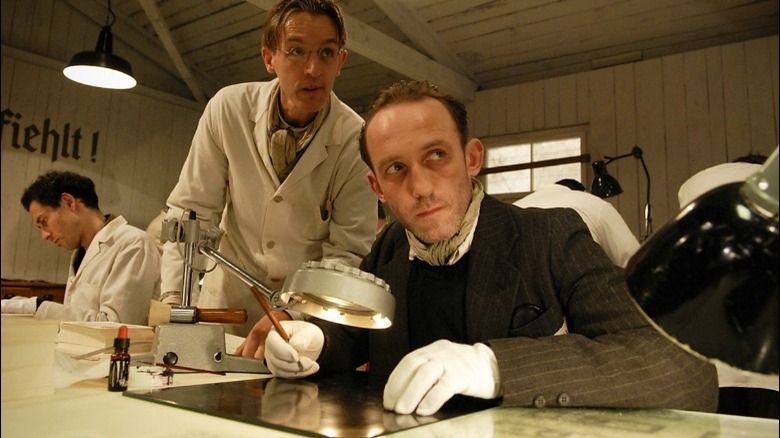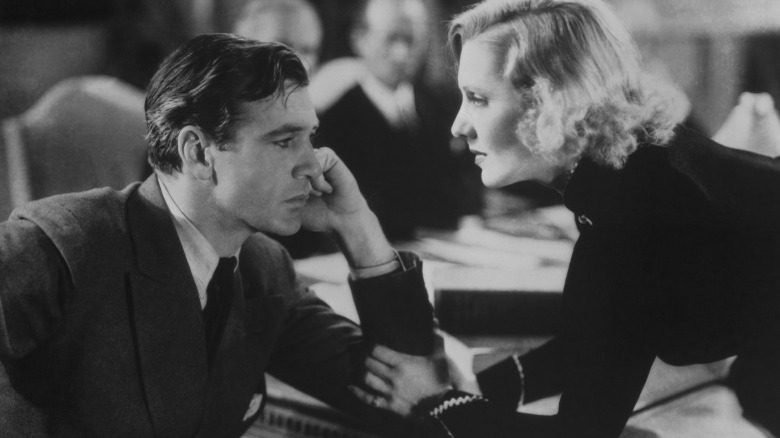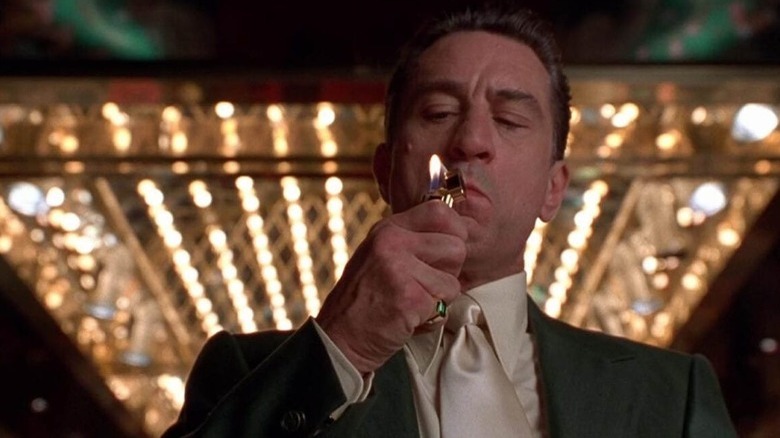25 Movies About Money You Definitely Need To See
"Money makes the world go round" according to the great musical number in "Cabaret," and it is easy to see why: in many ways, our lives are dictated by cash. Whether we have too much of it, or, more likely, not enough, money is a universal motivator for people to work so they can survive. Unsurprisingly, because money is such a crucial part of almost every person on earth's existence, it's at the center of many great stories, whether in literature, theatre, television, or film. Many great filmmakers have explored money over a multitude of genres, looking at the way it affects people on an individual and international scale.
While exploring films about money, it's remarkable just how many approaches there are to the subject. Money is at the core of romances, thrillers, dramas, comedies, horrors, and more. You may not even realize that so many great films, at their core, are about cold hard cash. Here are 25 movies about money you definitely need to see.
Christmas in July
When thinking about money and cinema, it's easy to imagine worlds of financial collapse, widespread greed, and endless corruption. While that is certainly the case for a number of great films about money, there are plenty of different and surprising approaches to the topic. One of those comes from the brilliant Preston Sturgess, in the delightful comedy "Christmas in July."
In the charming movie, the working-class Jimmy MacDonald (Dick Powell) is down on his luck, but that's all about to change, as he's just found out he's the winner of a slogan contest, and the $25,000 (an eye-watering amount of money in 1940) promises him incredible wealth. There's only one problem – MacDonald didn't actually win anything and is just being pranked by his co-workers. As great comedies often do, things get wildly out of hand, and before any pranksters can reveal the truth, things escalate beyond anyone's wildest imagination.
Running at an impressively brisk 67 minutes, "Christmas in July" is a breezy comedy of errors about the power and influence money has over people, as well as its potentially life-changing properties. If you're looking for a film about money that's a lot funnier and charming than it is bleak, look no further than "Christmas in July."
Pickpocket
While many films about money take place on the world stage, looking at how money affects people on a national, or even international level, Robert Bresson's 1959 masterwork "Pickpocket" looks at things on a very small scale. The film follows Michel (Martin La Salle, who had never acted before), who begins a life of pickpocketing, only to soon find himself arrested. The film follows Michel's life as he tries to return to the up-and-up, but can't seem to resist the temptation of thievery.
A lot of Bresson's work may seem inaccessible to the average moviegoer, as his films employ non-professional actors, use non-linear storytelling, and generally feature minimalism — a far cry from the blockbusters of today. Despite their sparse qualities, his films are no less fascinating as a result and are more than worth experiencing. His movies about money, like "Pickpocket," are hypnotizing, and its philosophical musings on the life of a small-time thief are rich and rewarding. Bresson is no stranger to immense critical acclaim, and "Pickpocket" is one of his most celebrated films and is in the top 100 greatest films of all time including to the Sight and Sound critics poll.
L'argent
Have you ever wondered where your money goes after you spend it? It may not be something you've ever considered, but French master Robert Bresson examines the idea as part of his great 1983 film "L'argent." The film follows a counterfeit 500-Franc note as it makes its way from person to person before it winds up with a man who has no idea the note is fake, which lands him in troubles he never could have imagined. The film is a powerful expose of the way money can destroy lives.
Like all of Bresson's exemplary work, the film uses sound and action sparingly to maximize the emotional effect. "L'argent" has earned rave reviews, with Dave Kehr of the Chicago Reader saying "Bresson, working his soundtrack as assiduously as his visuals, once again make us realize how little use most films make of the resources of cinema. A masterpiece." Indeed, what "L'argent" may lack in style, it more than makes up for with substance.
$
Released as "$," and better known as "Dollars," this 1971 heist flick is both a joyful comedic romp and a surprisingly tense drama. Richard Brooks directed the film, which stars Warren Beatty as Joe Collins, a security expert who specializes in banks. He's seen by his peers as a paragon of ethical behavior and reliability, which of course Collins uses to his advantage, as he's planning quite the heist of his own. Who better to rob a bank than the person who is responsible for its safety? In order to pull it all off, he recruits a warm and charismatic call-girl by the name of Dawn Divine (a magnetic performance from Goldie Hawn). The pair have unexpected but delightful chemistry. As Roger Ebert explains in his review, "Their acting styles lie at right angles, so you get two textures in the same scene. Since the visual style of the movie keeps whamming textures against each other, this contrast in the acting really works."
Plus, there are few cinematic delights quite like Goldie Hawn securing enormous piles of money, producing practically orgasmic squeals that may very well have influenced Meg Ryan's famous deli scene in "When Harry Met Sally."
Uncut Gems
"This is how I win."
Featuring a stunning turn from the king of comedy Adam Sandler, "Uncut Gems" is a wildly entertaining, pulse-pounding thrill ride that doesn't relent for a second. Sandler stars as Howard, a jewelry dealer in New York City who has a stifling gambling addiction. As a result, he's in significant debt to seemingly everyone in the city, but his relentless thirst for hitting the big score finds him making a massive high-stakes bet that would not only lift himself and his family out of debt but, perhaps more importantly to Howard, achieve an enormous victory and finally get that high he so aggressively chases.
With a pulsating score from Daniel Lopatin and tension-racketing direction from Josh and Benny Safdie, "Uncut Gems" is a white-knuckle ride that won't let your heart rest for 135 minutes. It offers thrills that few other films can, thanks to a livewire performance from Sandler, playing a pretty despicable guy that you can't help but root for. The movie is a crushing statement on the parasitic influence of money, and how the promise for more and more wealth becomes increasingly addictive. It's a film that certainly isn't for the faint of heart, nor is it for those with sensitive ears – "Uncut Gems" has over 600 instances of profane language.
American Made
Superstar Tom Cruise stars in Doug Liman's ("Edge of Tomorrow") "American Made," which tells the story of real-life pilot Barry Seal (Cruise), who goes from a commercial airline pilot to a government informant when he gets caught in a major operation to smuggle arms and drugs via Central America. The film features a great cast including Cruise, Domhnall Gleeson, Sarah Wright, Jayma Mays, Caleb Landry Jones, and Jesse Plemons, and it's impressive for its bold and caustic portrayal of some heavy issues. The film was popular with fans, earning $134 million at the worldwide box office.
Complete with some really fantastic stunts, "American Made" is an entertaining and thoughtful look at the world of drug and arms smuggling and corruption, all in vain of earning unfathomable sums of cold, hard, cash. The film is unafraid to speak on the nastiness of its subject matter, and as David Sims of The Atlantic observes, the film features a "shockingly grim, remarkably embittered ending."
The Wolf of Wall Street
There's simply no stopping Martin Scorsese. While some may know him as the guy who doesn't like Marvel movies, they'd be remiss to forget that Scorsese is one of the most important figures in cinemas past and present, and is a relentless campaigner for film preservation all around the world. He's also a master filmmaker and a fourteen-time Oscar nominee. Despite his age, Scorsese continues to surprise, directing hit after hit, and bringing a feverish, childlike enthusiasm and energy behind the camera that results in some of the best films ever made.
One of his finest achievements is 2013's "The Wolf of Wall Street," a three-hour epic that feels half as long. It's based on the insane true story of the rise and fall of Jordan Belfort (a brilliant turn from Leonardo DiCaprio), a stock-broker who succumbs to relentless greed and finds himself embroiled in a massive scandal involving the FBI. "The Wolf of Wall Street" is a wild, unrelenting journey filled with drugs, sex, and a non-stop flurry of foul language, but above all, it's a total blast. The outstanding cast includes DiCaprio, Margot Robbie, Matthew McConaughey, Jonah Hill, Jon Bernthal, and Kyle Chandler, who all seem to be having the time of their lives working with Scorsese. Few films feel as alive as this one, which while being super entertaining, doesn't shy away from the ugly side of wealth.
Zola
"Y'all wanna hear a story about why me and this b—- fell out? It's kind of long and full of suspense" starts off an unpredictable twitter thread that provided the basis of "Zola." The film brilliantly directed by Janicza Bravo is filled with remarkable visual splendor, and if you're unfamiliar with the Twitter thread, plenty of jaw-dropping surprises.
The story of a friendship gone sour begins with stripper Zola (Taylour Paige) meeting the charismatic Stefani (Riley Keough) at Zola's second job as a waitress. The two have an instant rapport and work together at Stefani's club that very night. The following day, Stefani presents Zola with an irresistible opportunity: to spend a weekend with her in Tampa, where they can dance at a club and earn outrageous amounts of money for a small amount of work.
When the journey begins, it appears that things aren't quite as they should be, and the ladies are joined by Stefani's boyfriend Derek (Nicholas Braun of "Succession") and her roommate X (an astonishingly brilliant turn from Colman Domingo). What follows isn't just crazy, it is also darkly humorous and wickedly suspenseful. Despite the bright lights and bursts of color, "Zola" isn't afraid to get dark, exposing the difficulties and exploitation that women face.
Hustlers
"Hustlers," directed by Lorene Scafaria, features a character you'll never forget: the illustrious Ramona, played in a career-best performance by Jennifer Lopez. Ramona is by a considerable distance the most popular stripper at the club she works with, dancing with tantalizing ease that makes big spenders fork out the big bucks. The film is set in 2008, and when the economic collapse hits, Ramona and her colleagues find that their wealthy clientele aren't opening up their wallets as they used to, which leads to her and her friends concocting an epic scheme to regain financial control.
A passionate and often empowering film, "Hustlers" takes a complicated and thought-out heist usually reserved for a bank robbery and places it in a strip club, leading to fascinating results. The film was hugely popular with audiences, earning an impressive $157 million at the box office, and also received critical acclaim. As critic Douglas Greenwood observed for NME, the movie is "practically perfect," and that "its brilliance is indebted to many things, not least her satisfying, pin-sharp framing of this wild story." To top it all off, the film features an outstanding ensemble cast, including Constance Wu, Julia Stiles, Lili Reinhardt, Keke Palmer, and music superstars Cardi B, and Lizzo.
Money Monster
Directed by Jodie Foster, "Money Monster" isn't just the name of the film, but of the show within it. It's hosted by Lee Gates (George Clooney), who instructs viewers with stocks to pick up or dump (think Jim Cramer's "Mad Money"). Things take a shocking turn one day when Gates' live show is interrupted by an irate man with a gun (Jack O'Connell), who straps Gates with an explosive device, and holds the show hostage. Gates' producer Patty Fenn (Julia Roberts) is in his earpiece, trying to help him keep the situation calm and ultimately defuse it, while trying to unpack the mystery of the gunman's anger.
"Money Monster" has a lot to say about financial crises and the way that everyday people are the ones to suffer while the wealthiest manage to further line their pockets. The film ultimately tries to do a bit too much with its messaging, and it often gets muddled as a result, but the film is still more than worth checking out. Clooney in particular showcases an impressive charisma, and despite the film's mixed reviews, some critics were very positive about the movie. Empire's Chris Hewitt notes the movie "enjoyably skips around from drama to thriller to media satire and back again."
Gentlemen Prefer Blondes
"Don't you know that a man being rich is like a girl being pretty? You wouldn't marry a girl just because she's pretty, but my goodness, doesn't it help?" Those are the immortal words of Lorelei Lee (Marilyn Monroe) in the resplendent delights of "Gentlemen Prefer Blondes," directed by master filmmaker Howard Hawks. The glorious technicolor musical follows showgirls Lorelei and Dorothy (Jane Russell), best friends who are about to travel together before Lorelei is to be married. Her fiancee, Gus (Tommy Noonan), is exorbitantly wealthy, and can't wait to marry his darling, but his father is concerned that Lorelei is just in it for their family wealth. In order to test Lorelei, Gus' father enlists private investigator Ernie (Elliot Reid) to track her on her adventures, in hopes that he'll find evidence to prevent her from marrying his son.
Few movies sparkle with as much joy and clever wit as "Gentlemen Prefer Blondes." Marilyn Monroe showcases why she was one of the biggest names in Hollywood with an awesome performance, and Jane Russell is every bit as impressive in a far more restrained role. There are plenty of cleverly staged musical numbers as well, and the film has definitely left its mark on cinema history. The movie has a lot of fun with the ideas of money and wealth, and it cooly investigates what it means to actually marry for money. After all, as Lorelei cheekily sings, "diamonds are a girl's best friend."
Gold Diggers of 1933
Putting on a show musical was a popular storytelling method for movies in the 1930s, which rather literally involved a group of people putting on a big broadway show. Known for their creative choreography and fun musical numbers, they were a great source of entertainment for audiences during the great depression. In the case of the fabulous "Gold Diggers of 1933," they took the depression head-on. It's a story about a group of actresses who find themselves out of work when the theatre they work at is unable to pay the bills, and need to scheme to try and find a way back to work.
The opening and closing musical numbers are a wonderful reflection of the film and the American way during the Great Depression. Starting with "We're in the Money," a celebration of the economic success of the roaring twenties, a celebration of wealth, not worrying about paying bills, and being able to "look your landlord in the eye." The final number, "Remember My Forgotten Man," has a completely different tone from the upbeat opener. Joan Blondell is perfection in the number about how both the war and the economic downturn left people behind that were once celebrated. The images of men marching in the rain, in bread lines, and trying to find employment are every bit as potent now as they were in 1933, and "Gold Diggers of 1933" is a charming, funny, and powerful film about the money you won't soon forget.
Wall Street
"Greed, for lack of a better word, is good," laments Gordon Gekko (Michael Douglas). It's a microcosm for the entire idea of Oliver Stone's "Wall Street," about the dangers and nastiness of relentless greed. Douglas won an Oscar for portraying Gekko, a corporate raider, and he's deliciously villainous. Bud (Charlie Sheen) gets the opportunity of a lifetime when he gets a chance to work with Gekko. Unfortunately for Bud, he soon discovers how exactly Gekko has become such a success on Wall Street and sets out to take the man who once was his hero.
Oliver Stone's "Wall Street" was a great success, and has become a big part of popular culture. In the 2000 film "Boiler Room," the characters, who are also stockbrokers, see Gordon Gekko as a role model, and they even get together to quote his dialogue. The film was popular with critics, and David Denby of New York Magazine called it "a sensationally entertaining melodrama about greed and corruption...a movie that evokes the power of big money so strongly that you can savor it on your tongue.
Arbitrage
When your movie is called a word that means taking advantage of prices in two or more markets, you just know you are in for an experience about the downsides of doing whatever it takes to get rich. Thankfully, that's exactly what you get in writer and director Nicholas Jarecki's "Arbitrage." Richard Gere stars as Robert, an enormously successful hedge fund manager, who, after a long time of raking in the big bucks, has decided to retire and leave the world of big-time money-making. He works alongside his daughter Brooke (Brit Marling), who is preparing to sell her father's company upon retirement, which will allow both of them to have more money than they could ever possibly need.
They say what you don't know won't hurt you, but that's not true in the case of "Arbitrage," as Robert has been manipulating the books at his company for years to avoid being caught for some seriously scummy business practices. Jarecki's film is rich with suspense, turning a family drama and intimate character study on its head as panic begins to ensue as Robert scrambles to try and fix things to avoid some serious jail time, but perhaps even more important, pull off a massive sale on a massive scale. "Arbitrage" brought in moderate box-office receipts, but achieved rave reviews, with praise particularly focused on Gere's performance. As Barbara Sullivan of the Buffalo News said, the actor "turns in the best performance of his career, conveying with supreme skill and remarkable restraint the exquisite agony of Miller's desperation."
Catch Me If You Can
"Catch Me If You Can," a giddy and thrilling romp directed by Steven Spielberg, focuses on the ultimate con man and an FBI agent's immense journey to try and take him down. Based on an outrageous (probably) true story, the film follows Frank Abagnale (DiCaprio), a man who over his young life has truly mastered the world of scams and deception. Starting with small schemes, Abagnale's insatiable thirst to pull off bigger and bigger schemes soon finds himself attracting the attention of the FBI, especially agent Carl Hanratty (Tom Hanks), who is desperate to catch him. It's not long before Abagnale becomes one of the FBI's most wanted targets, launching a fascinating and fun journey with a love of big cash pay-offs at the heart of it.
There's nothing off-limits for Abagnale, who impersonates doctors, pilots, lawyers, and more on his quest for more and more cash. The film was a big commercial success and also received considerable critical acclaim. If you want a movie about money that isn't too heavy and isn't too light, "Catch Me If You Can" offers the perfect compromise, offering a whole lot of fun, but it doesn't hesitate to expose to the downside of greed, either.
Trading Places
An entertaining and hysterical social satire, John Landis' "Trading Places" is a whole lot of fun. The foundation of its story is a ridiculous but still-timely reminder of just how wild and powerful rich people can be, as Mortimer (Don Ameche) and his brother Randolph Duke (Ralph Bellamy) place a bet. The bet in question involves a swap, inspired by an encounter they oversaw between their employee, the wealthy and privileged Louis Winthorpe III (Dan Aykroyd), and street hustler Billy Ray Valentine (Eddie Murphy). Thanks to the Duke brother's morbid curiosity, Winthope and Valentine essentially swap lives, in order to see if Valentine can be every bit as successful as Winthorpe, despite having polar opposite life experiences.
The movie was a huge success, making full use of its big stars in Aykroyd and Murphy, as well as a great ensemble cast including Denholm Elliot and Jamie Lee Curtis. The movie grossed $90 million, which was a massive result in 1983, making it the fourth-highest earning film of the year.
The Big Short
It was a pretty big surprise when filmmaker Adam McKay – who directed comedies like "Step Brothers," "The Other Guys," and "Anchorman 2: The Legend Continues" – took a sharp turn with his next film, "The Big Short." While the film has some funny moments, it's a surprisingly stark political drama about the financial collapse in 2008. The film cleverly traces how the economic downfall began and doesn't shy away from complicated terminology. In order to explain complex subject matter, it cleverly relied on cameos of actors explaining things – most notoriously, using Margot Robbie in a bubble bath to explain mortgage bonds. The film featured an A-list ensemble cast including Steve Carell, Ryan Gosling, Brad Pitt, Marisa Tomei, and Christian Bale, and offers a searing critique of those at the highest levels of wealth and how they swindled the rest of the nation to lead to a global economic disaster.
The film was a big hit, and McKay won an Oscar for Best Adapted Screenplay alongside his co-writer Charles Randolph. The film is a great opportunity to be entertained and learn all about complex economic structures at the same time, and there aren't many films that offer that enticing opportunity.
Margin Call
Another film that traces the 2008 economic collapse in a very different style, JC Chandor's impressive directorial debut "Margin Call" is a great choice if you're looking for a movie about money. Like "The Big Short," it also has a tremendous ensemble cast, including Jeremy Irons, Zachary Quinto, Stanley Tucci, Paul Bettany, Penn Badgley, and Demi Moore, but it's tonally a lot darker and tenser. "Margin Call" takes place over a single day at the very beginning of the financial crisis.
The film is a tense and complicated portrait of the financial crisis, and if you're unaware of the ins and outs, it may be a great idea to start with a movie like "The Big Short" before diving into "Margin Call." Even if you know nothing about the moment in history, it's still a strong thriller with great performances from its ensemble, and it's a well-told story that really makes you think about the power money has over people. The film received strong reviews from critics, with Brian D. Johnson of Maclean's noting how tense it all feels, saying it's "like a submarine movie: a chamber piece that sends us on a claustrophobic descent into the depths of the financial crisis."
It's A Mad Mad Mad Mad World
A crazy race for a whole lot of money lies at the core of Stanley Kramer's "It's A Mad Mad Mad Mad World," a madcap adventure all about the extents people will go to to get rich quick. When a story of $350,000 buried in a California state park spreads like wildfire, an enormous group of people makes their way to the park in order to get the life-changing sum of money. It's an extremely long movie at over three hours, has dozens of characters and countless nutty setpieces, which all come together beautifully to create a portrait of delightful insanity.
The Oscar-winning film features a dazzling ensemble cast including movie legends Spencer Tracy, Milton Berle, Buddy Hackett, Mickey Rooney, Edie Adams, Sid Caesar, and some brilliant cameos from Buster Keaton, Sterling Holloway, and The Three Stooges. It's genuinely thrilling to see the movie, which was released in the early 1960s, as it feels refreshingly modern, and its long sequences of unbridled chaos are a joy to behold.
Double Indemnity
What would you do for love? That's one of the questions at the center of Billy Wilder's noir masterpiece "Double Indemnity." It's the story of a man, insurance salesman Walter (Fred MacMurray), who falls head over heels in love with the fascinating Phyllis (Barbara Stanwyck in one of cinema's great performances). Phyllis can't stand her husband, and while for most people that would just lead to divorce, she's far more sinister and plans to kill him to be free of him once and for all. It's not just to have him gone, but her motivations are based on dollar signs – she'll be able to live well off of the accidental death claim on his insurance. Walter agrees to help Phyllis with the intent of being her new husband, but helping her pull off fraud may have some seriously sinister consequences.
"Double Indemnity" was hugely successful, earning 7 Academy Award nominations. The film has more than stood the test of time and has had an impact on cinema since its release in 1944, placing comfortably in the IMDB top 250. It's also received a great deal of critical acclaim, with Marjory Adams of the Boston Globe "powerful, ruthless, and almost cruelly exciting," and Reg Whitley of the Daily Mirror called the film "An ingenious, cleverly written and well-acted melodrama, which teems with suspense and thrills."
Glengarry Glen Ross
It's not often an actor can enter a film for a single scene and completely shift the mood, but that's exactly what Alec Baldwin does in his brilliant supporting turn in "Glengarry Glen Ross." As Blake, Baldwin storms into Premiere Properties, the real estate agency where our characters work, in an effort to motivate them, the motivation quickly turns into a verbal lashing. Blake makes the stakes clear – only the two best salesmen will get the lucrative leads, and the rest of the team will lose their jobs. He leaves them shaken, and the words that fuel their desperation are "Always be closing."
Despite being a box office disappointment, the film is warmly remembered for its terrific performances from Jack Lemmon, Al Pacino, and Ed Harris, its intelligent screenplay, and its powerful portrayal of the high-pressure world of sales looking at both the delirious highs and the crushing lows. Pacino is particular is thrilling to watch, and he earned a Supporting Actor nomination for the film (Pacino won the same year in the Lead Actor category for "Scent of A Woman"). As the agency's top salesman, he delivers a dynamic performance full of cockiness, anger, and manipulation, as he'll do anything to stay on top.
Fox and His Friends
Not to be confused with the news program, Rainer Werner Fassbinder's "Fox and His Friends" is a study of the interplay between love and money. Fassbinder co-wrote and directed the film, as well as starring as Franz, a working-class man. Franz works at a carnival, where he's better known as Fox, and he is a simple, friendly guy who is satisfied with his place in life. He buys a lottery ticket, thinking nothing of it, but soon discovers that the unthinkable has happened: he's won the lottery, earning a significant amount of wealth as a result.
Fox finds himself suddenly climbing the social ladder in 1970s West Germany, and it is not long before he finds himself a new love in boyfriend in Eugen (Peter Chatel). The bourgeois Eugen is notably higher class than Fox, which Eugen uses to his full advantage, slowly but surely swindling Fox's wealth to increase his own. Fassbinder is no stranger to a bleak social commentary, directing European classics like "The Bitter Tears of Petra Von Kant," "Fear Eats the Soul," "Effie Briest," and "Fox and His Friends" is certainly a tragedy. It's also an eye-opening look at homosexuality in the 1970s, which is a certain rarity in cinema, and the movie looks at things in an equally critical and sympathetic eye, which only a filmmaker like Fassbinder can pull off.
The Counterfeiters
A fascinating angle for a film set during the Second World War, "The Counterfeiters" is a thrilling movie about an enormous counterfeit operation. During the war, the German's reserves were dwindling, and the country took desperate measures to avoid complete bankruptcy. Enter Solomon Sorowitsch (Karl Markovics), a Jewish man who was imprisoned for forgery. In order to make the operation successful, German officers enlisted Sorowitsch to work on Operation Bernhard, a real-life operation that involved Nazi Germany forging British money to ensure their continuing atrocities. Sorowitsch found himself with an extraordinary moral quandary, working to help the very enemies who wanted his people annihilated to forge currency in order to escape the concentration camps and save his own life.
Exploring the world of counterfeit money combined with an incredible moral dilemma, Stefan Ruzowitzky's "The Counterfeiters" casts a hypnotic spell on audiences. It's a genuinely enthralling movie with great performances takes the idea of money and does really interesting things with it. The film was a big success, winning the Academy Award for Best Foreign Language Film, and garnered critical acclaim as well. Critic Jim Schembri for The Age called "The Counterfeiters" "the most unnerving, disturbing, true-life account yet of endurance under Nazi oppression." Above all, the film is a stunning tribute to the incredible perseverance of the human spirit.
Mr. Deeds Goes To Town
"He's nuts!"
"Your behavior, to say the least, has been most strange."
"He's pixellated."
"Oh yes, he's pixelated alright."
These are just some of the townspeople's opinions about Longfellow Deeds (Gary Cooper), a man who inherits an eye-watering sum of $20 million from his Uncle. That's an amount of money that could more than change your life in contemporary society, but back in the Great Depression, when the film takes place, it's an unfathomable number. When Deeds moves to New York City, the news of his wealth follows him, and everyone seems utterly transfixed by the goings-on of Mr. Deeds. He's certainly not your typical rich guy, and he discovers a solution to his immense wealth: create large farms that can provide homes for thousands of homeless families across America. In glorious screwball comedy fashion, the townsfolk believe this to be a most bizarre use of wealth and worry that Mr. Deeds is genuinely insane.
While quite a few movies on this list are dark in nature, exploring the ways humanity's obsession with wealth and greed often lead to tragic downfalls. For a much lighter, family-friendly take on money is Frank Capra's ("It's A Wonderful Life") "Mr. Deeds Goes to Town," a heartwarming comedy from 1936. The film earned Frank Capra one of his three Best Director Oscars and features fantastic chemistry from Cooper and Jean Arthur.
Casino
Few make gangster movies like Martin Scorsese – actually, it's probably fair to say that nobody makes gangster flicks like the cinematic maestro himself. Gangsters go hand in hand with money, which is probably why many of the director's great films center around cold hard cash, like "The Wolf of Wall Street," which is on this very list, and "Goodfellas," "Mean Streets," and "The Color of Money." Another excellent Scorsese film about money is "Casino," his 1995 epic starring Robert De Niro, Joe Pesci, and Sharon Stone, in a film about gangsters, as well as the inner workings of Las Vegas casinos.
The film's narration (provided by multiple characters) provides a look into this immense and labyrinthine world, where gambling expert Sam "Ace" Rothstein (De Niro) receives a life-changing chance from the mob to oversee operations at Vegas' Tangiers Casino. He falls head-over-heels in love with Ginger McKenna (Sharon Stone), a woman who hustles for a living, and has no genuine interest in him, but accepts the marriage out of convenience. Unfortunately for Ace, he's completely convinced that marrying Ginger will bring them both happiness, as he has all the money in the world to protect her, and provide her with anything she could ever need or want. "Casino" looks phenomenal with the endless lights of the casino and the city of Las Vegas, and it has a strong and effective message that unlimited wealth is, in fact, not the key to happiness.
